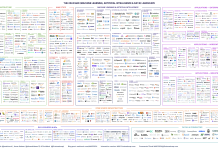Pure Storage today (31 July) reveals that just under half (48%) of government ICT leaders have confidence that their current data infrastructure enables them to meet strategic transformational objectives
The survey of 101 senior government ICT leaders, found that current data infrastructure is seen to compromise operational agility (85%), increase operational costs (83%), create compliance challenges (82%) and decrease the ability to meet citizen expectations (80%).
These findings have been revealed by Pure Storage in their new report, entitled ‘UK SMART GOVERNMENT REPORT: DATA-DRIVEN TRANSFORMATION’, designed to uncover the current state of digital transformation projects in UK Central Government.
Digital Transformation Progress: The report found that only 49% of current government ICT projects are considered to fully meet expectations, and be delivered within time and on budget.
A better use of data has been identified as a key enabler for central government departments to drive internal change, adhere to policy changes and improve citizen outcomes. However, despite the recognition that data is a primary enabler, legacy infrastructure is potentially constraining these plans.
Improving Citizen Outcomes: 83% recognise that data is a tool that can transform experiences for citizens, with that same number in turn believing this can put trust back in government.
With citizen expectations ever-increasing, the use of data was identified as vital to improving the following areas:
● 49% believe data was important to deliver a time-efficient service for citizens
● 43% stated that delivering a reliable, uninterrupted and mobile optimised service will be driven by data
● 42% responded that data can help create a simple and smooth experience for users
Driving internal change
As well as citizen outcomes, the use of data has also been identified as a positive tool that can help governments future-proof themselves, under increasingly difficult circumstances. In an era where budgets continue to decrease, over half (54%) believe that they could be making better use of data and analytics to deliver cost savings and derive more value. A further 42% stated that this would also allow for better real-time decision making.
Adhering to policy changes
There are a number of other factors accelerating the need for departments to overhaul their data strategy and infrastructure. These include government requirements to be “cloud first” (51%), public scrutiny and increased citizen expectations (50%), the need for increased collaboration and the move to a “connected” government (43%).
Barriers to transformation
49% plan to overhaul their data strategy and infrastructure to better support their departmental strategic objectives within the next two years. However, the biggest barriers standing in their way are; investment in data infrastructure (89%), investment in applications (80%), legacy processes and lack of agility (78%), and lack of digital skills and experience (77%).
Shaun Collings, Director, Public Sector UK, Pure Storage said:
“Data has the potential to enable the transformation programmes of central government departments; whether it is helping to deliver strategic objectives, implement policy changes or provide an overall better service to citizens. While it is encouraging to see that government ICT leaders recognise this potential, there are hurdles to overcome when it comes to accessing, storing, structuring and managing this data.”
“The legacy architecture that many departments have in place does not fully support the efforts to obtaining greater value from data. A modern ICT environment is needed that can scale-up on demand, align application workloads with the most effective infrastructure and promise 100% non-disruption so that the government can truly achieve its digital transformation goals.”











